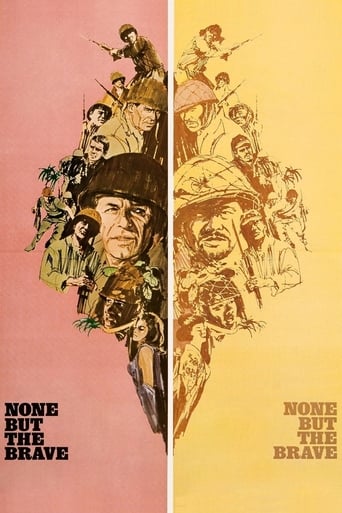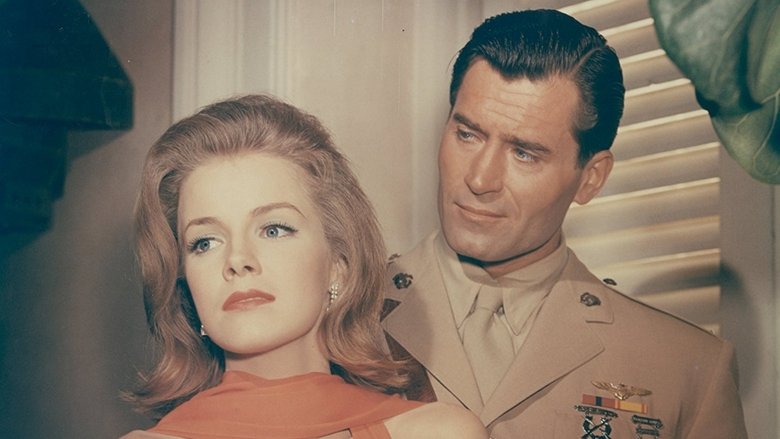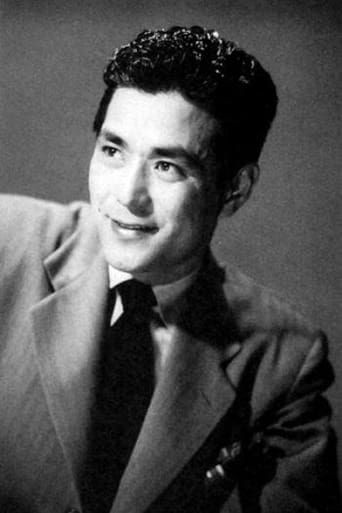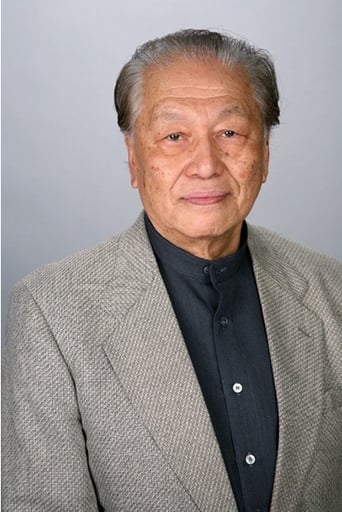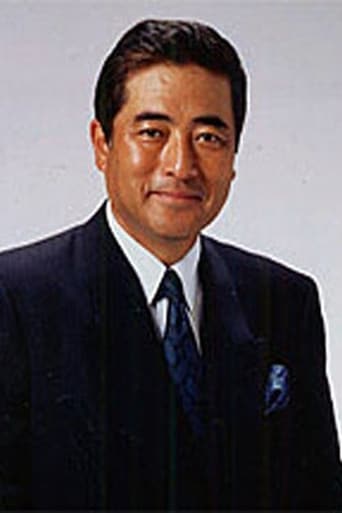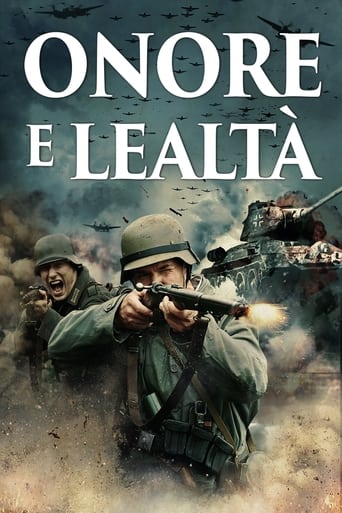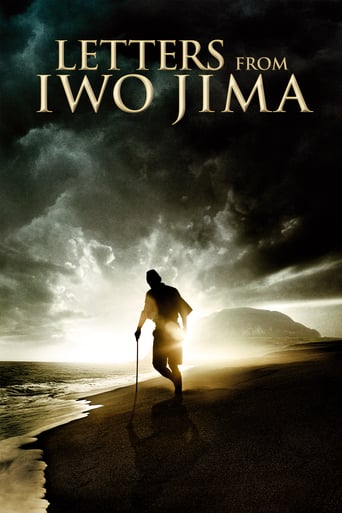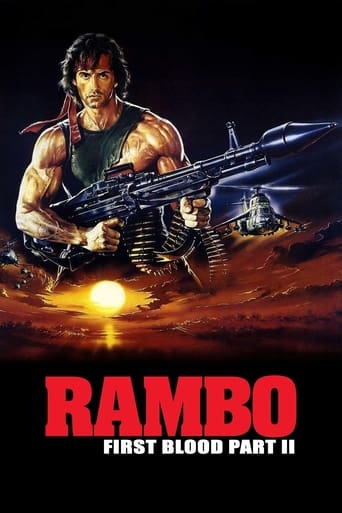None But the Brave (1965)
American and Japanese soldiers, stranded on a tiny Pacific island during World War II, must make a temporary truce and cooperate to survive various tribulations. Told through the eyes of the American and Japanese unit commanders, who must deal with an atmosphere of growing distrust and tension between their men.
Watch Trailer
Free Trial Channels
Cast


Similar titles
Reviews
Best movie of this year hands down!
Blending excellent reporting and strong storytelling, this is a disturbing film truly stranger than fiction
The movie's neither hopeful in contrived ways, nor hopeless in different contrived ways. Somehow it manages to be wonderful
The plot isn't so bad, but the pace of storytelling is too slow which makes people bored. Certain moments are so obvious and unnecessary for the main plot. I would've fast-forwarded those moments if it was an online streaming. The ending looks like implying a sequel, not sure if this movie will get one
How would soldiers behave if they weren't forced to fight? It's a very thought-provoking question, one that's answered in the WWII drama None But the Brave. Frank Sinatra directed the film, and given the strong themes of friendship and loyalty present in the script, it's easy to see why he was drawn to it.A Japanese platoon is stranded on a tropical island, and as they try to build a boat to escape from the island and return to the war, an American plane crashes on the island. Both sides are isolated, and while at first they're hostile towards each other, as time passes with no rescue from either country, they agree to a temporary truce. As the friendship grows between the commanders and soldiers, there's a sense of dread and sadness looming overhead. If they are rescued, will they immediately become enemies again? Everything in this movie is shared equally between the Japanese and Americans, from the screenplay written by John Twist and Katsuya Susaki, to the dual languages present in the opening credits, to the similar dynamics between the commanders and their soldiers. While Tatsuya Mihashi has the largest role of the Japanese cast, and Clint Walker is the lead of the American cast, the entire ensemble cast gives very good performances. The slow change from wariness to trust is built steadily through the scenes, and as the men begin to dread a potential rescue, the audience feels it just as strongly.While there's very little fighting in this film, it's a very important war movie. If you think character development and internal tension are just as important as battle scenes, you're going to want to watch None But the Brave the next time you're in the mood for a WWII movie.
Some people choose to see war as good vs. evil. Perhaps at a macroscopic or ideological level, it can be seen that way. But on a human level, eye-to-eye with the enemy, everything changes. That is why, in boot camp, the first thing a recruit learns is to de-humanize the enemy, or worse, to hate the person in his target sights. This is a powerful film which explores what happens when soldiers dare to meet their targets face to face and re-humanize them.Set on a remote, uncharted isle in the pacific, two enemy platoons find themselves marooned with no connection to the war. They fight, with heavy casualties on both sides, but due to the close quarters, it's inevitable that they would come to see each other as human beings & neighbours. That's as much as I'll say because the rest is for you to discover.This is not a WWII film. There are no politics mentioned, and aside from the uniforms it could be about any two warring nations--India & Pakistan, Israel & Palestine, 18th century France & England--and the script would basically remain the same. The message of the film is absolute.Frank Sinatra made his first, and I think his only, directing effort here, and I thought it was spectacular. Like many of his films it has a somewhat playful delivery, but when the moment calls for gravity, we get it as heavy as a sack of bricks. The "amputation scene" is a great example. Done entirely without music, wide camera so we can see everyone's tension (down to the Buddhist priest chanting quietly in the background), and perhaps the sweatiest scene of Sinatra's career.If you like this kind of challenging war movie which dares to show both sides of the coin, I also recommend "Merry Christmas, Mr. Lawrence" (set in a Japanese POW camp), "The Young Lions" (starring Marlon Brando as a Nazi soldier with a heart), "Das Boot" (a boot full of Nazis with hearts) or my favourite, a great Korean war-comedy-drama called "Welcome to Dongmakgol".
During World War II, some United States marines crash-land on an island inhabited by a stranded platoon of Japan's finest. At first, the opposing cultures clash; but, due to their isolation, the fighting men learn commonalities - and, they assist each other, to survive. What will happen when the outside world intrudes? "None But the Brave" is, unfortunately, a very ordinary production. Frank Sinatra (as Mate Maloney) could be counted among the brave, for the film's somewhat daring thesis. Mr. Sinatra, who co-produced and directed, offers an unexpected point-of-view.Sinatra's boozing on-screen character is interesting because well, just because he's Frank Sinatra. In between swigs, Sinatra amputates a leg; that, and a bit of bad weather are the film's big dramatic moments The parallel scenes of the opposing cultures in flashback are a highlight. The Japanese, led by Tatsuya Mihashi (as Lieutenant Kuroki) outperform the Americans, led by Clint Walker (as Dennis Bourke). Sinatra son-in-law Tommy Sands (as Lieutenant Blair) clearly illustrates Sinatra's generosity; soon, Mr. Sands would discover the Chairman had around two categories for human relationships."None But the Brave" is too careless to be classic; but, it suggests Sinatra might have had an interesting and successful film directorial career, if he chose to focus on that particular credit. **** None But the Brave (2/24/65) Frank Sinatra ~ Frank Sinatra, Clint Walker, Tommy Sands, Tatsuya Mihashi
On a tiny forgotten island in the Pacific, there a tiny and forgotten Japanese outpost--with men who'd become stuck there with no great hope of rescue. Into this tiny place arrives a crashing airplane filled with US Marines. When they land, hostilities naturally break out between the groups. However, after a while they realize that killing each other will solve nothing and they have to work together to survive--forging an uneasy peace and friendship between enemy combatants.NONE BUT THE BRAVE is a film that is a real product of the times. Had anyone wanted to make such a film in the 1940s, they might just have been strung up for the film's very unusual sensibilities. Unlike older war films, in this one the Japanese are humanized a great deal and it's obvious that the film was made during the anti-war 60s (though early in the anti-war years). In many ways, this is a good thing--showing that people on both sides could be decent. Though in some ways the whole thing seemed a bit hard to believe--after all, very, very few Japanese officers would have admitted to not having faith in the war--this was a very 1960s sentiment.As for the acting, it was generally good. Clint Walker was clearly the star, though Frank Sinatra had a decent co-starring role in this film that he both produced and directed. The Japanese actors also were pretty good. The only weak point was the way Tommy Sands' character was written--he was like a one-dimensional caricature instead of a real soldier. No young lieutenant is THAT obnoxious and stupid!! Overall, an entertaining film but one that strains credibility, as the concept behind the film just doesn't make much sense for the 1940s. Still, if you can stop those voices in your head from complaining about the plot, it's a good and very different movie.

